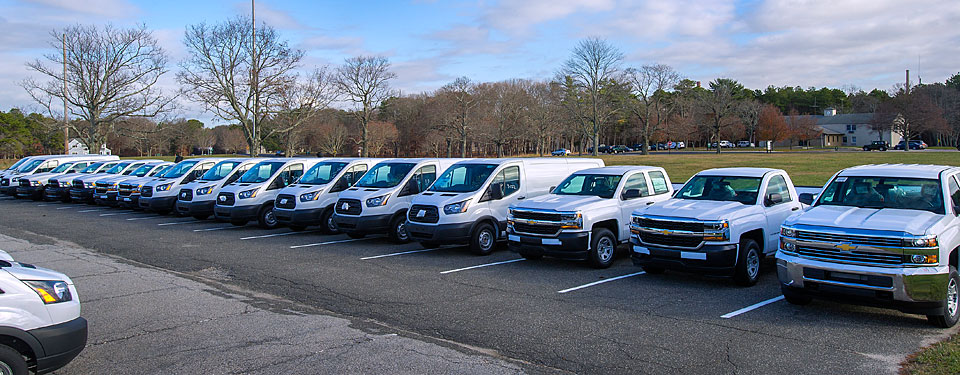Fleet Management
Brookhaven Lab is committed to maintaining a vehicle fleet that's reliable, safe, and fuel efficient. This is achieved through regular maintenance and a cost-effective leasing program arranged with the U.S. General Services Administration.

Some of the GSA replacement vehicles arrive on-site, ready to be prepped and assigned.
At the Laboratory, we have developed and implemented a number of transportation programs to help us achieve our sustainability goals. This includes reducing the use of petroleum, eliminating non-essential vehicles where possible, and increasing the use of alternative fuel. The Laboratory has a unique and diverse portfolio of alternative fuels for powering our vehicles. In addition to a traditional gasoline station, there are also on-site fueling facilities for E-85 and biodiesel. Our biofuel station is open 24 hours a day, seven days a week and is the pit stop for refueling the Lab’s nearly 60 biofuel Kubotas and five John Deere Gators (small utility vehicles). The use of biofuel is one of many steps toward meeting goals to decrease our dependence on foreign oil and increase our use of renewable energy.
Another major improvement was the Laboratory’s transition to the General Services Administration (GSA) Vehicle Leasing Program in FY2015. The Vehicle Leasing Program transferred ownership of most of the Lab's vehicles to the GSA and allows the Lab to lease new vehicles for its fleet from the GSA. Through this program, the vast majority of vehicles replaced—nearly 97 percent—will be alternative fuel vehicles. This is expected to result in a much more sustainable fleet, as well as significant cost savings for the Laboratory each year. Also, under the GSA transition, fleet vehicles will be replaced on a regular schedule, most when they reach seven years in service. Prior to the transition, the average age of most vehicles in the Lab's fleet was approximately 11 years. Under the GSA program, that average will come down to closer to four years—an improvement that will result in more reliable vehicles with the latest safety features and much improved fuel efficiency.
The use of biofuel is one of many steps toward meeting the goals of the President’s executive order to decrease our dependence on foreign oil and increase our use of renewable energy



